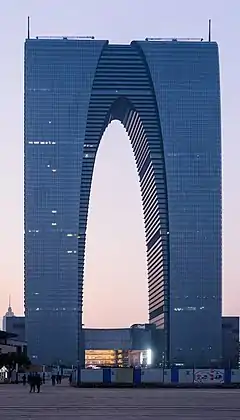Gate to the East
The Gate to the East, also known as the Gate of the Orient, (simplified Chinese: 东方之门; traditional Chinese: 東方之門; pinyin: dōng fāng zhī mén) is the second tallest building in Suzhou, Jiangsu, China behind Suzhou IFS. It is intended to be a symbol of a gateway to the city which emphasizes the city's continuing significance in modern China. With a height of 301.8 metres (990 ft), the building is located in the heart of Suzhou's China–Singapore Suzhou Industrial Park (SIP) district. Construction began in 2004 and was completed in 2016 at a cost of $700 million USD. Its location precisely indicates the intersection of the historical east-west-axis of Suzhou Old Town with the west bank of Jinji Lake.
| Gate to the East (东方之门) | |
|---|---|
 Gate to the East in Suzhou | |
 Location within China | |
| Alternative names | Gate of the Orient or The Pants Building |
| General information | |
| Status | Complete |
| Type | commercial, transportation |
| Location | Suzhou, Jiangsu, China |
| Coordinates | 31°19′01″N 120°40′44″E |
| Construction started | 2004 |
| Completed | 2016 |
| Cost | $700,000,000 (USD) (Budget) |
| Height | 301.8 m (990.2 ft) |
| Technical details | |
| Size | 340,000 square metres (3,700,000 sq ft) |
| Floor count | 68 |
| Floor area | 450,000 m2 (4,800,000 sq ft) |
| Lifts/elevators | 6 |
| Design and construction | |
| Architect | RMJM |
| References | |
| [1] | |

Criticism
Though its design was intended to evoke a gateway, the Gate to the East has been subjected to mockery by many Chinese netizens and western mass media as well, as "resembling a pair of trousers".[2][3][4] The landmark has thus led to a slew of internet parodies.[4]
Transport
See also
References
- "Gate of the Orient, Suzhou, China – Portfolio". RMJM. Retrieved 2012-11-22.
- "British-designed skyscraper resembles big pants, say angry Chinese". Telegraph. 2012-09-04. Retrieved 2012-11-22.
- "$700 million skyscraper 'resembles a pair of pants'". News.com.au. 2012-09-05. Retrieved 2012-11-22.
- "Netizens: New China building is 'pants' | CNN Travel". Travel.cnn.com. 2012-09-07. Retrieved 2012-11-22.